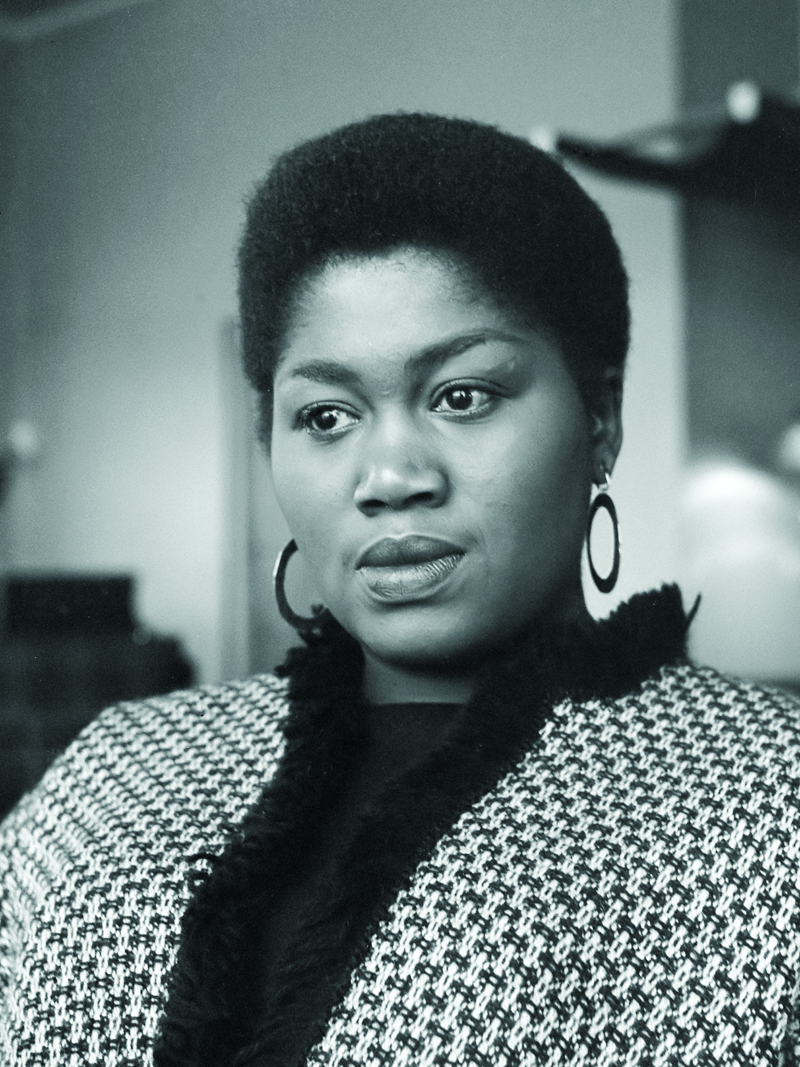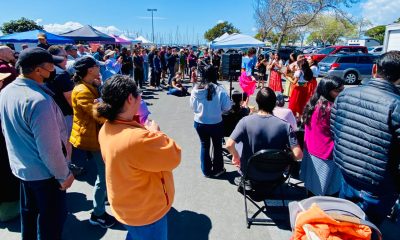Black History
Odetta Gordon: Citizen of the World
Bob Dylan once commented that “hearing Odetta on record turned me on to folk singing.”

Odetta Gordon (1930–2008) was born in Birmingham. After her father’s death, she moved to Los Angeles with her mother. What she didn’t leave behind was the soul of Birmingham. The city’s deep Southern music had become a part of young Odetta’s being.
At age 13, Odetta studied piano, had voice training, and taught herself to play the guitar. Later, she earned a degree in classical music from Los Angeles City College and performed in a 1949 production of Finian’s Rainbow in San Francisco. Soon (1950s) she would emerge as an important figure in the New York folk music scene.
Gordon relocated to New York City, where her talent was supported by performers such as Harry Belafonte and Pete Seeger. With their encouragement, she performed and recorded more widely. Her repertoire included a distinctive blend of spirituals, slave songs, prison and work songs, folk ballads, Caribbean songs, and blues. Her career had taken off.
In New York, Gordon released her solo recording, Odetta Sings Ballads and Blues (1956), followed by At the Gate of Horn (1957). Bob Dylan once commented that “hearing Odetta on record turned me on to folk singing.” Her voice beckoned four repeat performances at the Newport Folk Festival (1959–65) and subsequent appearances at Carnegie Hall, on television and in several films including Sanctuary (1961).
Gordon’s career continued to blossom. She performed with symphony orchestras and in operas worldwide. She was a featured performer throughout the states, her audience weaving through various cultures. Dr. Martin Luther King, Jr. dubbed Gordon “queen of American folk.” She had the “ear” of the people, thus were next on her agenda.
In 1963, Gordon performed at the historic March on Washington and took part in the March on Selma. She sang for President Kennedy and his cabinet on the nationally televised civil rights special, Dinner with the President. Through addressing political and social issues Gordon had become an important advocate for civil rights; an activist for social change.
Sadly, the movement lost steam and interest in folk music began to wane. As a result, Gordon’s career started to lose its fire. Still, she continued to perform throughout the 1960s and 70s internationally. She recorded Odetta Sings the Blues (1967) and in 1974, appeared in the television film The Autobiography of Miss Jane Pittman. In 1987, the concert marking forty years of her life as a performer (1986) was released as the live recording Movin’ It On.
In 1999 President Clinton awarded Gordon the National Medal of Arts, the highest award given in the arts in the United States. The Library of Congress, in 2003, named her a Living Legend.
Gordon is remembered as an American folk singer who was noted especially for her versions of spirituals and became for many the voice of the civil rights movement of the early 1960s. She passed away on December 2, 2008, at the age of 77.
Source: https://www.thehistorymakers.org/biography/odetta-gordon-41
https://www.britannica.com/biography/Odetta
Image: By Jac. de Nijs / Anefo – Nationaal Archief, CC0, https://commons.wikimedia.org/w/index.php?curid=31277817
Activism
Oakland Post: Week of April 24 – 30, 2024
The printed Weekly Edition of the Oakland Post: Week of April 24 – 30, 2024

To enlarge your view of this issue, use the slider, magnifying glass icon or full page icon in the lower right corner of the browser window. ![]()
Activism
Oakland Post: Week of April 17 – 23, 2024
The printed Weekly Edition of the Oakland Post: Week of April 17 – 23, 2024

To enlarge your view of this issue, use the slider, magnifying glass icon or full page icon in the lower right corner of the browser window. ![]()
Black History
Matthew Henson: Explorer Extraordinaire
Matthew Henson, a trailblazing explorer who overcame countless obstacles to leave an incredible mark on history. Born on August 8, 1866, in Charles County, Maryland, his journey is a testament to the power of determination and the spirit of adventure.

By Tamara Shiloh
Matthew Henson, a trailblazing explorer who overcame countless obstacles to leave an incredible mark on history. Born on August 8, 1866, in Charles County, Maryland, his journey is a testament to the power of determination and the spirit of adventure.
Henson’s life began amidst the backdrop of post-Civil War America, where opportunities for African Americans were scarce. From a young age, he possessed an insatiable curiosity about the world beyond his small town. At the age of 12, he embarked on a journey that would change the course of his life forever when he joined a merchant ship as a cabin boy.
His most famous expedition was his journey to the Arctic with renowned explorer Robert E. Peary. In 1887, Henson joined Peary’s crew as a seaman and quickly proved himself to be invaluable with his skills as a navigator and craftsman. Over the course of several expeditions, Matthew endured extreme cold, treacherous terrain, and grueling conditions as he and Peary sought to reach the elusive North Pole.
In 1908–09, Peary set out on his eighth attempt to reach the North Pole. It was a big expedition, with Peary planning to leave supplies along the way. When he and Henson boarded their ship, the Roosevelt, leaving Greenland on August 18, 1909, they were joined by a large group. This included 22 Inuit men, 17 Inuit women, 10 children, 246 dogs, 70 tons of whale meat, blubber from 50 walruses, hunting gear, and tons of coal.
In February, Henson and Peary left their anchored ship at Ellesmere Island’s Cape Sheridan, along with the Inuit men and 130 dogs. They worked together to set up a trail and supplies along the way to the Pole.
Peary picked Henson and four Inuit people to join him in the final push to the Pole. However, before they reached their destination, Peary couldn’t walk anymore and had to ride in a dog sled. He sent Henson ahead to scout the way. In a later interview with a newspaper, Henson recalled being in the lead and realizing they had gone too far. The group turned back, and Henson noticed his footprints helped guide them to their destination. At that location, Henson planted the American flag.
Henson’s legacy extends far beyond his expeditions to the Arctic. He shattered racial barriers in the world of exploration and inspired countless individuals, regardless of race, to dream big and pursue their passions. In 1937, he was finally recognized for his achievements when he was inducted into The Explorers Club, an organization dedicated to promoting scientific exploration and field research.
Matthew Henson died in the Bronx, New York, on March 9, 1955, at the age of 88.
-

 Activism4 weeks ago
Activism4 weeks agoOakland Post: Week of March 27 – April 2, 2024
-

 #NNPA BlackPress4 weeks ago
#NNPA BlackPress4 weeks agoBeloved Actor and Activist Louis Cameron Gossett Jr. Dies at 87
-

 Community2 weeks ago
Community2 weeks agoFinancial Assistance Bill for Descendants of Enslaved Persons to Help Them Purchase, Own, or Maintain a Home
-

 Activism3 weeks ago
Activism3 weeks agoOakland Post: Week of April 3 – 6, 2024
-

 Business2 weeks ago
Business2 weeks agoV.P. Kamala Harris: Americans With Criminal Records Will Soon Be Eligible for SBA Loans
-

 Activism2 weeks ago
Activism2 weeks agoOakland Post: Week of April 10 – 16, 2024
-

 Community2 weeks ago
Community2 weeks agoAG Bonta Says Oakland School Leaders Should Comply with State Laws to Avoid ‘Disparate Harm’ When Closing or Merging Schools
-

 Community1 week ago
Community1 week agoOakland WNBA Player to be Inducted Into Hall of Fame





















































